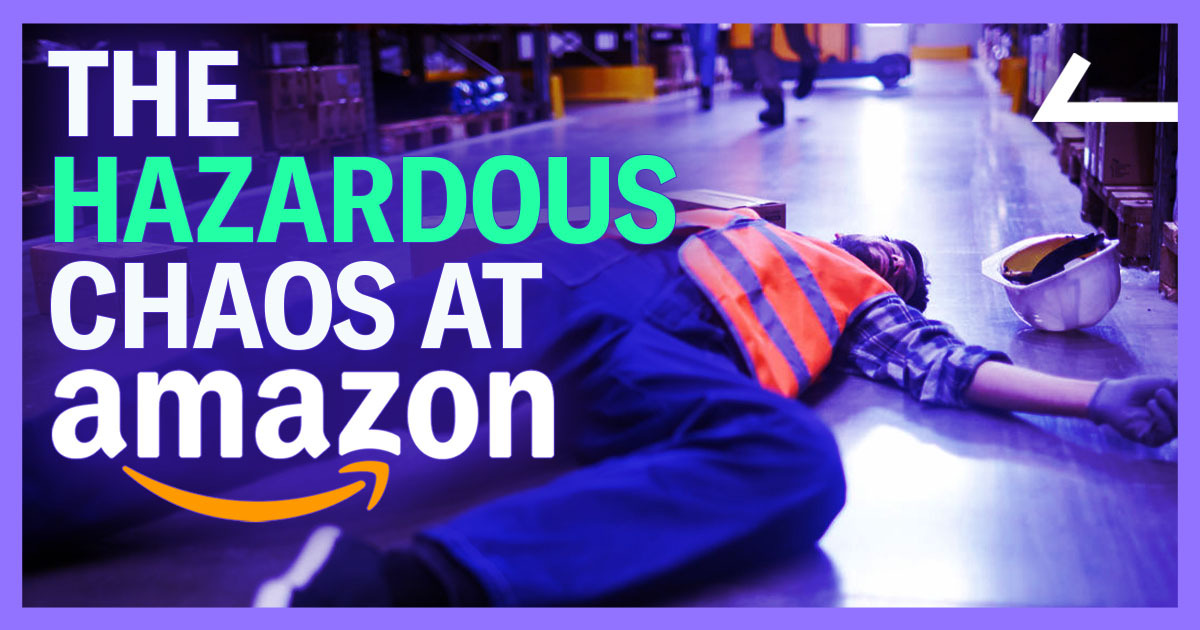Produced and Edited by Jordan Zakarin and Nes Sanchez
Amazon workers in Albany, NY are speaking out about the death trap conditions inside their warehouse. They describe relentless pressure in brutal conditions. The injuries are constant. Strokes. Heat exhaustion. Head trauma. It’s why they’re unionizing with Amazon Labor Union. We spoke with these workers. Below is a full transcript of the video.
Heather Goodall: I saw an employee that was driving this 8,000 pound piece of equipment and he was struggling to get the harness on. On Break, he was sitting down and I went over and I said, hi, how are you feeling today? And he said, I’m okay. And he had a little bit of a slurred speech. So he started to tell me how he suffered a stroke in the warehouse on Thanksgiving.
I couldn’t believe that there was no support for him. Nobody seemed to care. And he came right back to operate that piece of machinery that he suffered a stroke on. So at that moment, everything changed for me.
The injuries are on a daily basis.
Kimberly Lane: Injuries are so common. I don’t know how many people have left in ambulances.
Heather: I am what they call a picker. I drive a PIT machine, which is an 8,000 pound piece of equipment, that we take into the aisles and we retrieve items for orders.
Andre Beaupre: I am a packer. I make sure that the packages get sent out to dock on time.
Kimberly: I am a packer and a slammer. It’s at the slam station where it gets the shipping label. Then the slammer weighs the package puts it on another conveyor where it goes up and around the facility and eventually ends up at the docks.
Heather: As a picker, I have to retrieve 45 items in an hour. And that includes all of those heavy, heavy pieces of equipment: auto equipment, dressers, you know, fireplaces, vacuums, air conditioners, you name it.
Andre: “Quota, quota. Make sure we get the priorities out.”
Kimberly: The injuries are definitely affected by these quotas and by the stress.
Tia Leanza: We’re moving boxes that are teeny tiny little things up to supposedly 50 pounds, but I can’t tell you how many countless times I’ve had to lift boxes 60, 70, 80 pounds.
Heather: As I was driving this 8,000 pound piece of equipment to retrieve items, I noticed that there was wires, you know, metal wires sticking out in what we call the very narrow aisles. So I may lean to the side to see if I can get a better visual. However, that better visual could result in this wire taking my eye out.
Look at the boxes protruding out of the aisles and the condition of the boxes, because the aisles are so narrow the shelves are overstuffed to the point where there are shelves that are collapsing. Items that are falling off the shelves onto employees at I believe up to 28 feet.
Kimberly: I started September 13th. By the end of October, I was in the emergency room. I literally fell on the floor one day. I could not stand up. I could not stand up straight. I was just laying there in severe pain. Somebody said, “Go get [Amazon Emergency Care]” and Amcare walks down about 10 minutes later without a wheelchair. I drove myself to the ER, and did find out that I did have a hernia and had to have surgery.
Tia: One of the women in the facility had a severe head injury, that she had to be carried out in an ambulance.
Kimberly: I would drive home from work and I’d have to sit in my car for a minute and sometimes literally lift my legs up and lift my legs out of the car. Cause I just couldn’t move them. They just wouldn’t work. And just walking up the stairs, it was constant pain. Absolutely constant pain.
Tia: You know, I use my legs all the time to lift. I go home with bruises on my thighs. It looks like I’ve been beaten.
Heather: We’ve had over 100 EMS responses to the building, and a majority is dehydration or employees passing out. Because they’re afraid that if you drink more water, then you go to the bathroom. If you go to the bathroom then you’re going to be written up for time off task.
Andre: You can usually feel like it’s somewhere around 80 or 90 degrees.
Heather: When I came back from COVID after three weeks, I was staring at a sign that said “No more COVID pay, no excuses.” I literally thought I was being punked. HR was serious as could be and said, “we’re not paying COVID anymore.” I called the New York State Department of Health, confirmed, “Yep, they are going to get their COVID pay.” And that was when I went into into battle. That’s when I went into battle. And I started building the arsenal. And my arsenal I knew I had to protect these people.
Andre: I want to see that people are cared about. That is my biggest thing. I get upset when I’m walking down and these people feel oppressed.
Heather: These people are my family so now the fight is for them and for us.
Videography by Jessica Sherry



